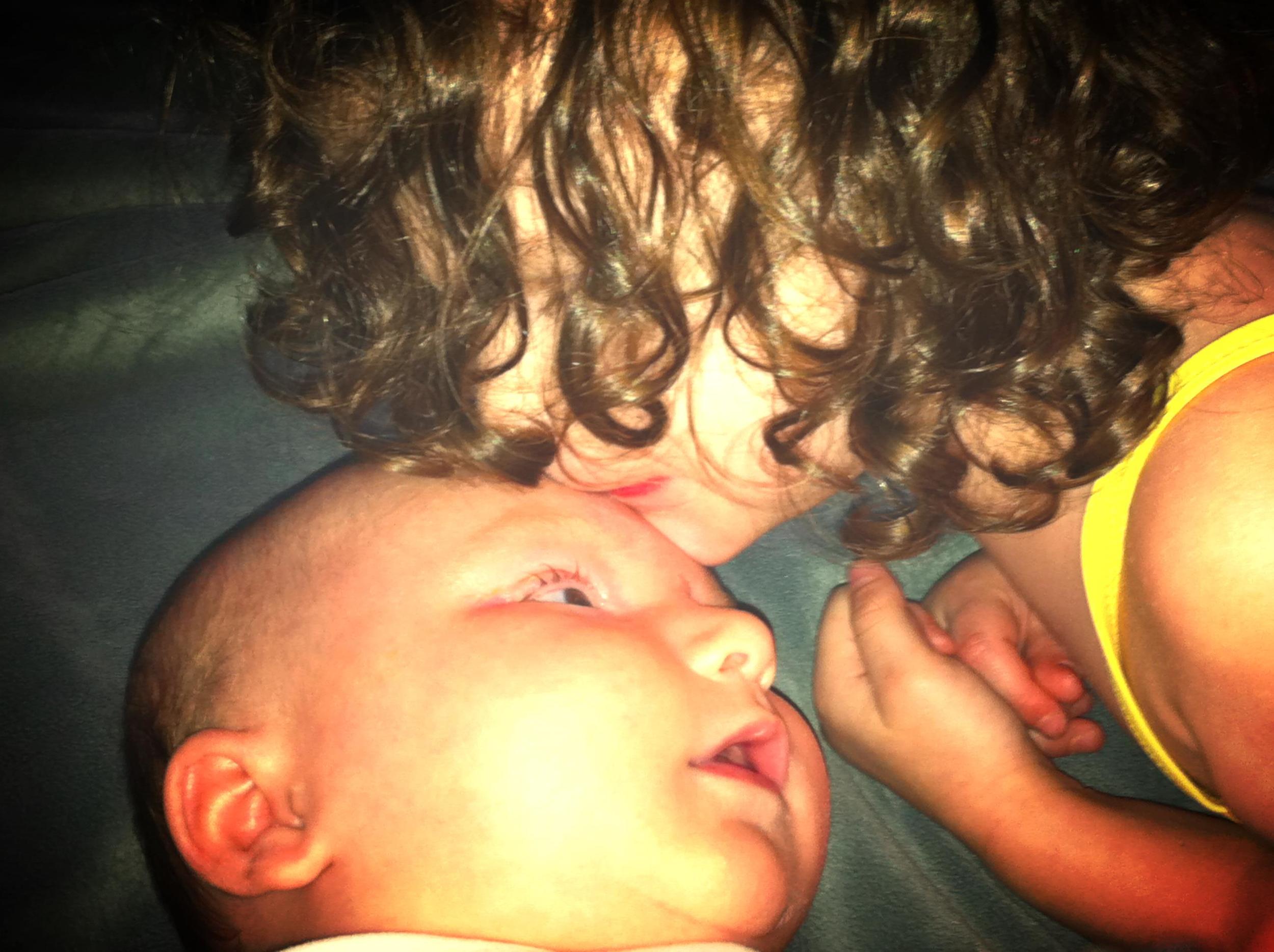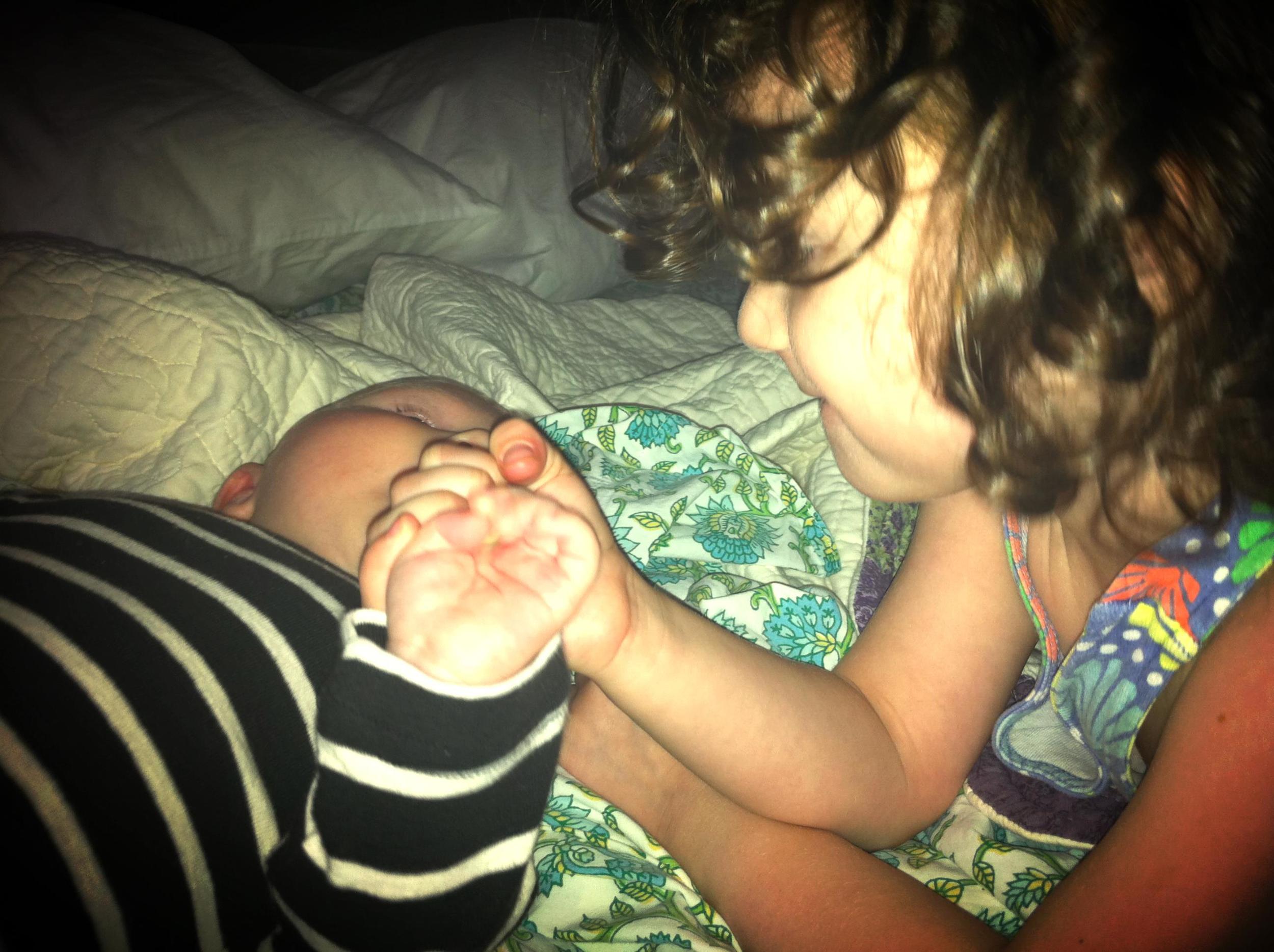I read something recently by a woman who wrote that becoming a mom made her politically prolife. At first blush, I get that. It makes some kind of sense. Babies and all.
But I disagree completely. Being a mom has made me adamantly prochoice.
The piece also got me thinking about this question—when did you begin to feel like the pregnancy inside your body was something other than your body... that it was an actual baby?
My husband and I first heard our daughter’s heartbeat when I was about 8 weeks pregnant. He cried. Listening to the sound of the fetal heartbeat was moving to him. For me? Not so much. It was weird and hard to process. I felt little scared and a little excited, but I didn’t feel like there was a baby in my body at that moment.
Six months earlier, I’d been pregnant for seven weeks. It was an ectopic pregnancy that ended with a dramatic emergency room visit. When I lost that pregnancy, it was a real loss. I was sad. I mourned. It was not devastating, as I can only imagine the loss of a child or the loss of a full-term baby during childbirth would be. Of course, anyone suffering from any of those losses will feel the loss in their own way.
For me, it’s really hard to pinpoint when my pregnancies felt more like a baby than my own body. In some ways, I’m not sure it really sunk in until the baby was out of my body, in my arms and breathing, with a face and a voice and a name. Even with my second baby, when I should have somehow been more ready for that moment, it still felt like a surprise when I gave birth and saw this little person, exactly as he had been inside my body moments before, now outside me and in front of my eyes.
The question of when life begins—when a pregnancy becomes a baby—may be a controversial political question, but it’s also a deeply personal experience for every pregnant woman living in her own body. And while I don’t think public policy on a woman’s right to an abortion should be decided based on my—or anyone else’s personal experience, it isn’t exactly separate either. (This article is a must-read discussion on the question of when life begins and the prochoice movement.)
For most people, when it comes to deciding whether to call themselves prochoice or prolife, they’d rather answer, “It’s complicated.” As Robert P. Jones wrote in his Figuring Faith column in the Washington Post last May, “Support for legal abortion has remained steady even as Americans’ identification with the politicized “pro-choice” or “pro-life” labels has fluctuated.” My personal stance on abortion has changed throughout my life, but my politics have always been prochoice.
My most deeply held belief about abortion rights is that if you can’t become pregnant, you’re welcome to call yourself prochoice or prolife, but in terms of advocating for legislation that will never impact you, just don’t. If you have no way of ever knowing what you might do if you were pregnant and didn’t want to be, then you’re in over your head.
When I was a teenager in high school, learning about all of this complicated life stuff, I thought that women should be free to decide for themselves what they believe and what’s right for them. But, of course, I thought, I would never make "that" choice. I would never have an abortion.
And I continued to believe that until I had barely exited my teens and got pregnant. I was 20 and halfway through college when I chose to have an abortion. Despite my previous thoughts on the subject, and how sure I was of them, I knew my decision from the moment I knew I was pregnant. I'm so grateful that I had a choice and grateful for the choice I made.
Because, you know what? You don’t really, truly know what you’d do until you’re staring at a positive pregnancy test.
When I got pregnant again in my early thirties, I was happily married and the baby was well-planned. And when that pregnancy turned out to be ectopic, I was really scared the whole baby thing was never going to happen for me. I thought constantly about the decision I'd make a decade earlier. I felt cursed, I felt punished, I felt bitter at the irony, but mostly I just felt really, really sad. And then I got pregnant again and gave birth to a beautiful baby girl.
Finally and very happily a mother, it started to sink in how hard this parenting gig is. I knew more deeply than ever that I had made the right choice with my first pregnancy. How could I ever have managed a baby at that age, with that guy or more likely alone? How could my life have moved past that point, to any happy place, after an unplanned baby was born and took over everything? As they do.
As a mother, I was lucky to be able to be at home full-time with my daughter, with the support of an amazing husband and everything we could possibly need, and it was still hard. Amazing, beautiful, magical, wonderful, yes, of course all of those things, but also hard. Really, really, really hard. The lack of sleep, the crying, the isolation, the every day, in-and-out, the same thing and no way out ever. Not to mention the “can I really do this and not screw-up this beautiful little human being?”
In all seriousness, we did ok. We did our best. We had love more than anything else, for our baby and for each other. And as someone put it to me when I was pregnant, "You'll do fine. You're not a crackhead and you have the Internet."
Just before our daughter turned three, we welcomed a second baby into our family. Our son was also planned—we were ready and we were thrilled. With my son’s birth, I experienced sleeplessness like I never knew, and for this and other reasons, I went though a really tough postpartum depression. Somehow, I made it through that time, but I might not have. The hormonal changes that happen during pregnancy are powerful—and for some, especially those with a history of depression or anxiety, they can be scary.
Being pregnant is a little like playing Russian roulette—you don’t know what’s gonna hit you when you pull the trigger. It could be that the baby you get needs more from you than you imagined or the changes could be within yourself. No one knows what’s on the other side of pregnancy when they decide to have a baby.
I used to think I wanted to have three kids, but I know now that I’m done. If I got pregnant again, I would not, could not, choose to have the baby. To have a third baby would be wrong for me and for my family. I'm not sure I'd survive it. Not in a strict "life of the mother" kind of way that abortion restrictions have in mind, but I came too close to the scary bottom last time and I won't go there again. I love my kids too much to risk them losing their mother.
And I have made every effort to ensure I won't get pregnant again, but 98% effectiveness is not a 100% guarantee. We can do our best to avoid pregnancy, but unless anti-abortion crusaders think I should stop having sex with my husband, we can't be certain.
I never want to have another abortion. I’m sure it would be harder to go through now that I know firsthand what happens when a pregnancy ends with the birth of a baby. But I know that’s the choice I’d make. Or, rather, I think I know. The truth is, it’s hard for anyone to know what they would do if they became unexpectedly pregnant.
I wish no woman ever needed to have an abortion. But I live in the real world, with billions of other women, and we all deserve the right to make our own choices about our lives and our bodies, even if those decisions end up being different than we could have ever imagined. Life in the real world includes birth control failures, rape, medical problems, human imperfection and all kinds of decisions that are unimaginable until they are facing us.
The experience of becoming and being a mother may change the way a woman feels about ending a pregnancy, but I would hope it would also bring with it deeper understanding for women who face that decision. As mothers, we know what it feels like to be pregnant and to give birth and to love our babies. We also know how hard being a mother is and how much change comes with a baby, how much they need and how much they deserve.
No one should have to take on all that being a mother requires, or even all that pregnancy requires, if they don’t desire it fully. And that any baby would be born unwanted into this imperfect world is heartbreaking. And that's why being a mom has made me more pro-choice than ever.
If you want to read my next post, don't forget to LIKE my Facebook page.







